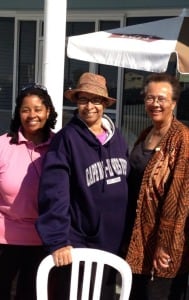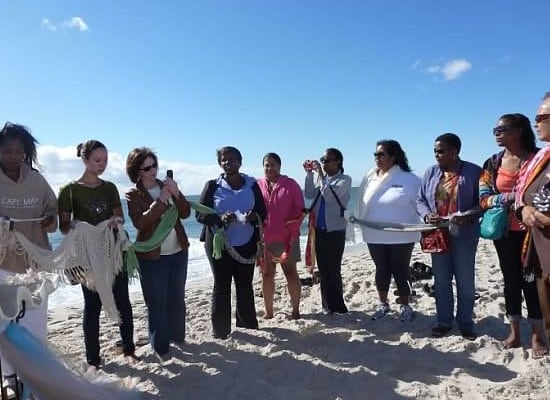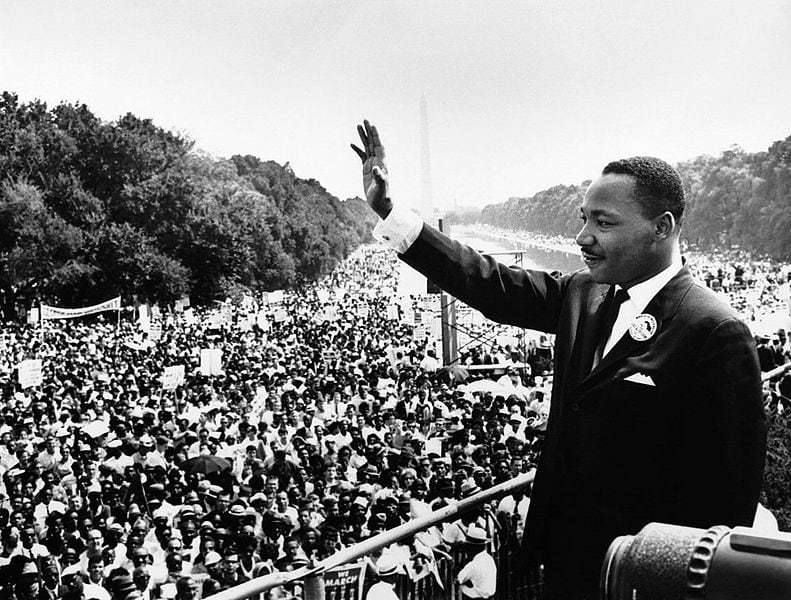By Jackie Jones
As we stood on the beach, holding hands, teary-eyed, watching the waves and listening to the surf, a flock of seagulls swept over our circle in a perfect diagonal formation, with one gull doing her own thing behind the group, swooping, soaring, circling.
We knew it was our Brenda.
Brenda Box Johnson loved Cape May, N.J. – an annual gathering spot for a group of us who call ourselves the Cape May Ladies. It’s a weekend of fun, shopping, pampering – no husbands, boyfriends or young children allowed – and communion among sister friends.
We have grown up and wiser together. We have lived through births and deaths and weddings and divorces and promotions and career changes. We hug, we cry, we sing, we laugh until we cry, we shop, we get our nails done, have massages and treat ourselves to fine restaurants. For many of us, the fall season isn’t the same if we have to miss our annual gathering.
Brenda loved sitting in a rocker and gazing at the beach from the upstairs porch of the Hotel Macomber, our home away from home for three days each year. Last year, Brenda defied terminal illness to get to Cape May for a chance to sit in that chair, to have breakfast at Zoe’s down the street from the Macomber and pose for the group photos.
We lost Brenda in March after an extensive and valiant fight against pancreatic cancer. In September, we held a memorial service on the beach, with about two dozen of us in attendance, including her mom, Lil Vaden, her sister Dawn, and Brenda’s daughters, Chantel and Chanel.
And the seagulls.
“They were like a plane of gulls, moving up and over us, giving us her blessing as we all held hands. More than anything else, that assured me of Brenda’s presence,” said Lynne Adrine, a close friend of Brenda’s and a longtime Cape May Lady.

Brenda Box Johnson, center, with Geri Coleman Tucker and Jackie Jones outside Zoe’s during her last visit to Cape May, N.J.
A Sanctuary by the Surf
We all came to the Cape for a special reason this year, but in any summer season, there is something exceptional ‘bout the place.
I’ve traveled far and wide and had many memorable trips, but first in my heart is Cape May.
It was the first place my father could afford to take us on vacation. It was 1964. I was 10 years old, and my folks had reconciled after a long separation. We were traveling as a family, and I was so proud of that.
It also meant I would have a true story to tell when I got back to school in the fall and had to write the obligatory “How I Spent My Summer Vacation” essay.
We stayed at the former Planter Motel. In 1964, it was owned by John and Janet “Dolly” Nash. Dolly was a childhood friend of my mother. The motel was named after the Confederate ship delivered into the hands of the Union Army during the Civil War by Dolly’s great-grandfather, 23-year-old Robert Smalls, who hired out and was paid to pilot the ship. A photogravure image of the ship hung on the wall behind the front desk. The Nashes, now deceased, gave my father the “friends-and-family discount” and we drove to Lewes, Dela., got on the ferry and took the 80-minute ride to the cape.
I walked the asphalt-covered boardwalk. I drank water out of a tinted glass for the first time, had a cheeseburger with white cheese (another first), took photos with my trusty Kodak Instamatic and rode bikes with my father. It was one of my happiest times as a child and I have returned time and again for vacations, with my mother, a former college roommate, and with my son, Tony.
A lot and little have changed over the years at the historic seaside resort town in the Ocean City Metropolitan Statistical Area that became popular in the 18th century as a restorative vacation destination. It is noted as a top bird-watching location, and for its many examples of Victorian architecture. There are special events tied to Halloween, Thanksgiving and Christmas. Many B&Bs stay open deeper into the year, and Christmastime in Cape May is especially delightful.
But it is the annual Cape May Ladies weekend that has become one of my most treasured traditions.
When Brenda was hospitalized last year just days before the big weekend, she fussed and fumed via Facebook and text messages. She insisted she would get to Cape May, come hell or high water, and she badgered the doctors at Johns Hopkins who insisted she needed rest into releasing her that Saturday.
Brenda told us she told doctors: “I could rest a whole lot better sitting on the porch in the rocking chair and looking at the beach than I can lying here with you waking me every hour to take my vital signs.”
She persuaded her husband, Steve Johnson, to take her to the ferry immediately upon her release so that she could join the crew.
She clearly was weak, but her brilliant, sarcastic wit was strong as ever, and our small, but hardy group had a great time at The Blue Pig.

“The annual Cape May Ladies weekend has become one of my most treasured traditions,” says writer Jackie Jones. Photo by Ellen Gee.
“Cape May, for Brenda, was the intersection of many passions — her fascination with all things Victorian, her intense interest in history, her concern for nature and wildlife, her emotional connection to water and her love of friends,” Geri Coleman Tucker said. “And when it came to friends, Brenda was a gatherer. She assembled an amazing group of women who became integral parts of her life.
Brenda was smart, funny, feisty, but most of all loving. No one who met Brenda walked away untouched by her in some way. The annual weekend, for many of us, is synonymous with Brenda.
“I didn’t know what to expect, but it was one I will never forget,” said Ellen Gee, a high school and college friend of Brenda’s who came to Cape May this year for the first time.
“The ladies that gathered had been doing this for years with Brenda, and although some did not know me they made me feel so welcome. I think this was Brenda’s personality that was coming across each of them.”
Brenda’s husband, Steve, sent a huge bag of her scarves with Geri so that we could incorporate them into the ceremony, which was performed by Macomber owner/manager Crystal, who has hosted the group for years, and each have a memento of Brenda.
We formed a circle and tied the scarves together to signal our ties to one another and to Brenda. At the end, as Israel Kamakawiwo’ole’s ukulele version of “Somewhere Over the Rainbow” played, we untied the scarves and held them aloft in the breeze as we faced the ocean and said our farewells to Brenda.
“Each day was beautiful from the Friday that I arrived to the Sunday morning when we left,” Gee said. When I saw a flock of birds that flew by, I took that as Brenda speaking to me and everyone else saying, ‘I’m OK everyone, and I’m looking after each of you with much love.’”
A proud Cape May Lady, Jackie Jones is a freelance writer in Washington, D.C., and journalism chair at Morgan State University.
Traveling to Cape May: What to Know Before You Go
The City of Cape May, which calls itself the “Nation’s Oldest Seashore Resort,” is at the southern tip of the Cape May Peninsula in New Jersey, where the Delaware Bay meets the Atlantic Ocean. It was named for a Dutch captain named Cornelius Jacobsen Mey, who explored and charted the area from 1611 to 1614, and established a claim for the province of New Netherland. New Englanders from the New Haven Colony later settled in the area.
The population of the city, which is an entire historic district, is about 3,600 year-round. It swells up to 50,000 during the summer with visitors and those who make Cape May their summer home. Cape May became a destination resort in the 18th century and is still known for its great beaches, as a top bird-watching location and its Victorian houses. The Travel Channel recognized it for having one of America’s top 10 beaches.
The city has a rich black history, and the Center for Community Arts offers an African American Heritage Walking Tour from April through September. The Akwaaba by the Sea Bed and Breakfast on Broadway has captured some of that history. Owner Monique Greenwood has vintage photographs of African Americans on the wall and has named the rooms of the inn, and a carriage house, after prominent black Cape May residents, including:
- William J. Moore, a local tennis instructor who during segregation became the first principal for West Cape May’s school for black children.
- Stephen Smith, founder of the African Methodist Episcopal Church in Cape May.
- Woody Woodland, co-founder of the famed Cape May Jazz Festival.
- Dolly Nash, former owner of Cape May’s Planter Motel and the great-granddaughter of Robert Smalls. Smalls commandeered a Confederate ship during the Civil War and piloted it into the hands of the Union Army. Nash’s husband, John, was a native of Cape May and a local historian.
- Helen Dickerson, the celebrated cook at the Chalfonte Hotel, noted for her southern cuisine.
Getting There
One treat for travelers along the Eastern Seaboard, from points south of New Jersey, is the Cape May-Lewes Ferry from Lewes, Del. It doesn’t shorten the trip overall, but it eases the drive and is a peaceful, meditative pause during the trip. You can fly to airports in Atlantic City, N.J., or Philadelphia and drive a rental car the rest of the way. If you have a plane or access to a corporate jet, you can land at the Cape May Airport.
— Jackie Jones








